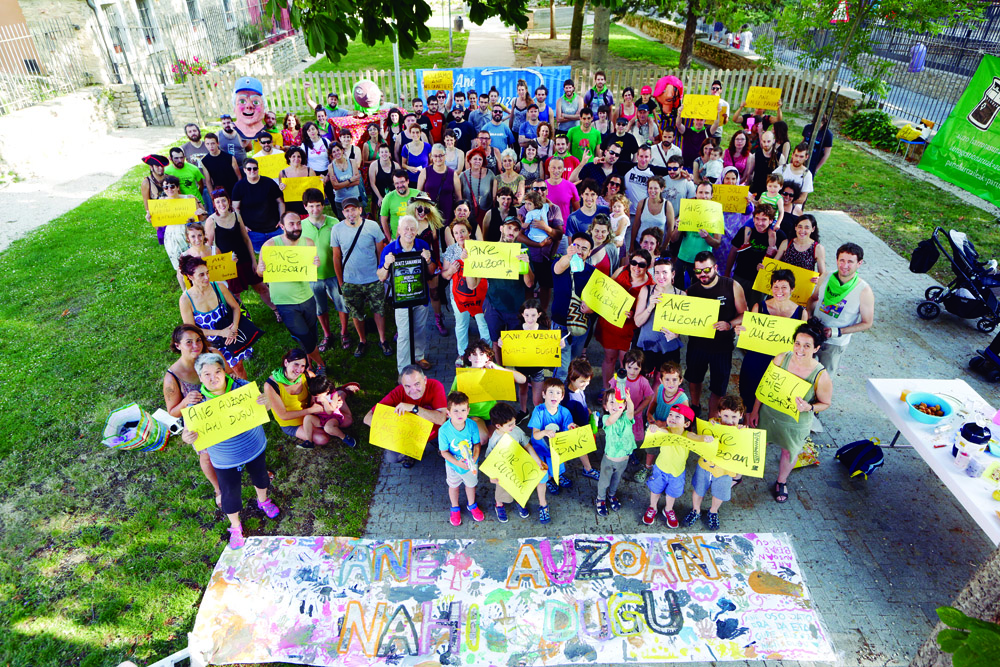"The National High Court will never judge the legitimacy of the organization and struggle of Basque citizenship"
- In Macrojudgment 11/13, Biscayan Ibon Meñika is one of the 47 accused, and during these months he has been one of the spokesmen for the accused. He was arrested in 2013 with other members of the Herrira association, and sat in the dock of the defendants of the Spanish National Court six years later. He sat at a short distance, as the process ended with an agreement just beginning. We have talked to him about the sweets and salt flats of the agreement, the consequences of repression or the challenges of the future.

“We didn’t come to the Spanish National Court for justice,” he said Monday before the court, just before he entered the trial. What are you looking for in the room?
We are aware that justice for Basque citizens has never been derived from emergency courts such as the National Court. In 2019, we can't expect that either. Two main motivations drove us. We believe that the majority of Basque society wants to leave behind the injustices linked to repression, which adds to the demand for the emptying of prisons, and in this regard one of the objectives was not to fill prisons with 47 more people. On the other hand, we wanted to place particular emphasis on the emergency penitentiary policy that is still in force, and on the need to bring about a solution to the issue of Basque prisoners and exiles. We wanted to make a collective contribution, to leave the suffering behind and to move towards feeding the solution.
We wanted to make a collective contribution, to leave the suffering behind and to move towards feeding the solution.
One of the objectives has not been fully achieved: Arantza Zulueta and Jon Enparantza will be imprisoned for five months. We would like to stress that its attitude has enabled a collective consensus decision to be taken.
It was clear to us that the decision should be collective and consensual. That does not mean that there has been no debate, that there are no contradictions, that we have not experienced harsh and tense situations. But we have made the decision, the debates, with that serenity.
Emotionally, how did they leave the courthouse? Faces of indifference and perplexity dominated the defendants...
47 people have been convicted and that is not good news for the Basque Country. Acceptance of this kind of punishment is burdensome. It's not easy, you have to make very tough decisions. And the context is that of a court of emergency that applies emergency policies. But the decision is that you want to act responsibly. At the end of the courtroom, we wanted to express that responsibility.
47 people have been convicted and that is not good news for the Basque Country. Acceptance of this kind of punishment is burdensome.
The Spanish National Court will never judge the legitimacy of the organization and struggle of the Basques, nor will it decide whether our action has been good or bad. It is very important to understand this, because if not, we will give the power of decision to the National Court. We will continue to work for prisoners and fleeing to return home, we will continue to be active in this fight. And the only one who will judge our work will be Basque Country. We owe ourselves to that.
On the other hand, the trial has not begun. Arrests, incarcerations, uncertainty, policing, personal suffering and suffering from those around us, among others, have been coming since 2013. On Monday, this whole cycle is closed and you're empty.
Do you think the agreement influences the story struggle?
The objective of the State was to put an end to the work and sustenance in favour of prisoners and fleeing, when we oppose it. Six years have passed since the first arrests. Has the State achieved its goals in 2019? It has, of course, conditioned it, but we believe that Basque society has surpassed the state. Prisoners continue to have legal, medical and affective assistance; Basque society continues to mobilize; there is a growing majority demanding solutions. We are not in a position to defend the tools, but to take steps towards political objectives.
The Basque society has overcome the juridical-political thesis of “everything is ETA”, so we put our contribution in another direction. Can all these steps lead to new opportunities for prisoners and exiles to come home? Maybe yes, we believe it. Of course it is debatable, but we have done so with that vocation, with conviction, and that is the debate.
The National Hearing shall be dissolved: When will the life of Basque citizenship no longer be conditioned? That is what we should be calling into question, not what the court says or not.
You mentioned the imprisonment of Zulueta and Enparantza. Disqualification also has raw effects on some of the defendants, isn't it?
No doubt. The ban on working in public administration affects many of us, it is a high personal cost. Some will suffer directly from the penalty. This also increases the value of having taken the decision by consensus. The fines are also there, it is almost EUR 60,000. And other consequences that are virtually lifelong. Having a background, for example, increases the risk of repression or imprisonment.
For many of us it is not the first condemnation. For example, I and Egoitz [Lopez de la Calle] were punished in the first macrojudgment of the theory of “everything is ETA” and of the strategy of illegalization [macrosumario Jarrai-Haika-Segi, judged in 2005]. The judge on Monday was the same as the judge presiding over the jury. And we will continue to suffer repression in the future. Nothing ended on Monday.
We will continue to suffer repression in the future. Nothing ended on Monday.
Even if it is an act of consensus and conviction, can it be irritating that after fourteen years it has to be found before the same judge and admit a crime?
Of course it does. The situation is very tense, extreme. No one wants to be in a situation like this, let alone in 2019, when we should be in the solution of the situation of prisoners and exiles.
Since the date of the trial was announced, you and your defence have publicly stated that they would study the possibilities of agreement. How has the process of materialising the agreement been?
In order for there to be an agreement, we had to agree three parts: 47 defendants; public prosecutor; and individual accusations [associations of victims of the AVT and Dignity and Justice]. There is nothing that can be done overnight.
Knowing that some of the above trials were closed with similar agreements, before discussing a possible agreement. In the past few months, we have been told at times that there could be opportunities, in others there was no room for agreement. The specific conditions of the agreement and in principle the agreement of the parties were agreed on the eve of the Bilbao demonstration, but without absolute guarantees. It runs on the same day 16. I think things are sometimes said too lightly. And in these cases, discretion and discretion seem to me to be key. Not only for us, but also for others to be able to choose.
They have convened briefings in the villages and neighborhoods of the accused, and are holding meetings with the agents. For what purpose?
We want to act responsibly and honestly. A lot of people have been working on the campaign these months. We feel the need to thank them and, as far as possible, we want to share our thoughts live with them all. On the other hand, we predicted an expenditure of EUR 350,000 to face the trial. We will have expenditure, but not so much, although we are not yet able to specify the accounts. We also want to be transparent. The proposal is to allocate the remaining money to the fight and to the fight against the barbarism of prisons and prisoners and exiles.
Solidarity with those suffering from injustice is a basic political value for the social transformation of any society.
In general, we would like to reorient the solidarity received towards other people who suffer injustices. Transfer prisoners and fled from the Basque conflict, but not only. Also to those who suffer from other forms of harassment, be they sexist, homophobic or racist assaults, be it police, youth from Altsasu, etc. Solidarity with those suffering from injustice is a basic political value for the social transformation of any society.
Irailaren 16an hasita, euskal presoen eskubideen defentsan aritutako 47 euskal herritar epaituko dituzte Espainiako Auzitegi Nazionalean: osasun arloko profesionalak, abokatuak eta presoen eskubideen aldeko eragileetako kideak dira auzipetuak. IrtenBidera. Giza eskubideak,... [+]






















